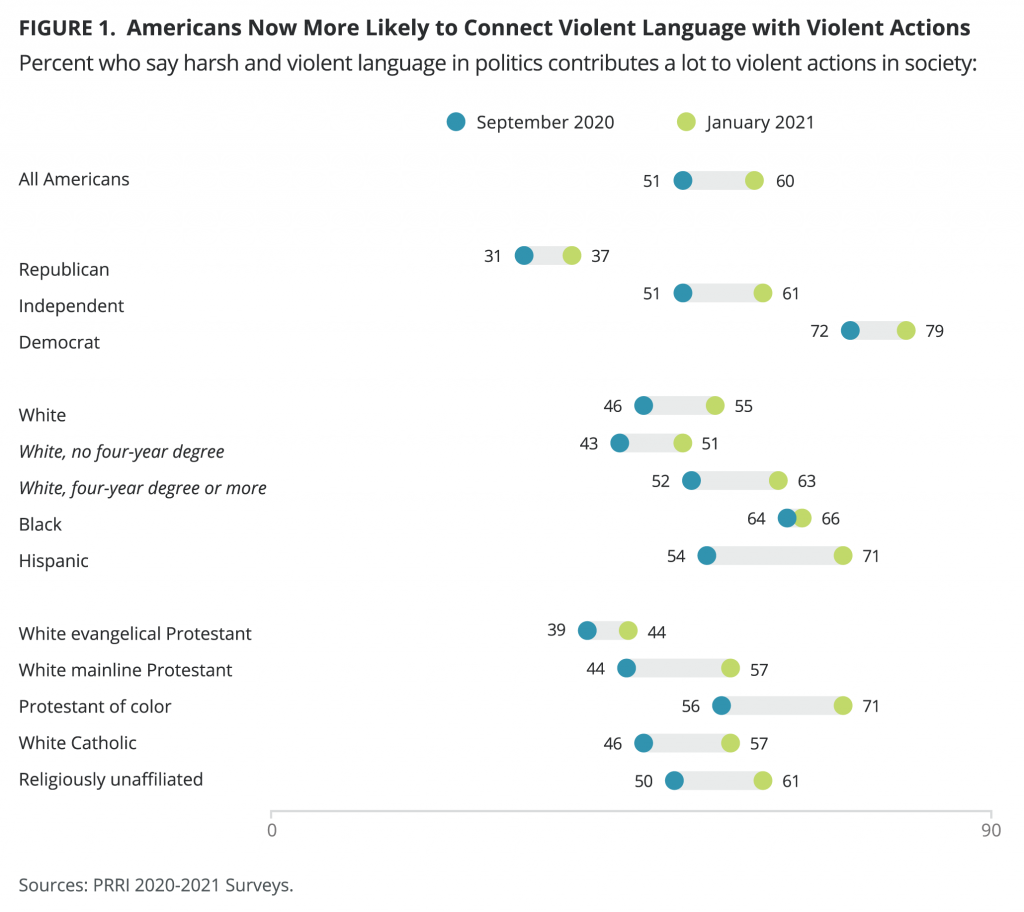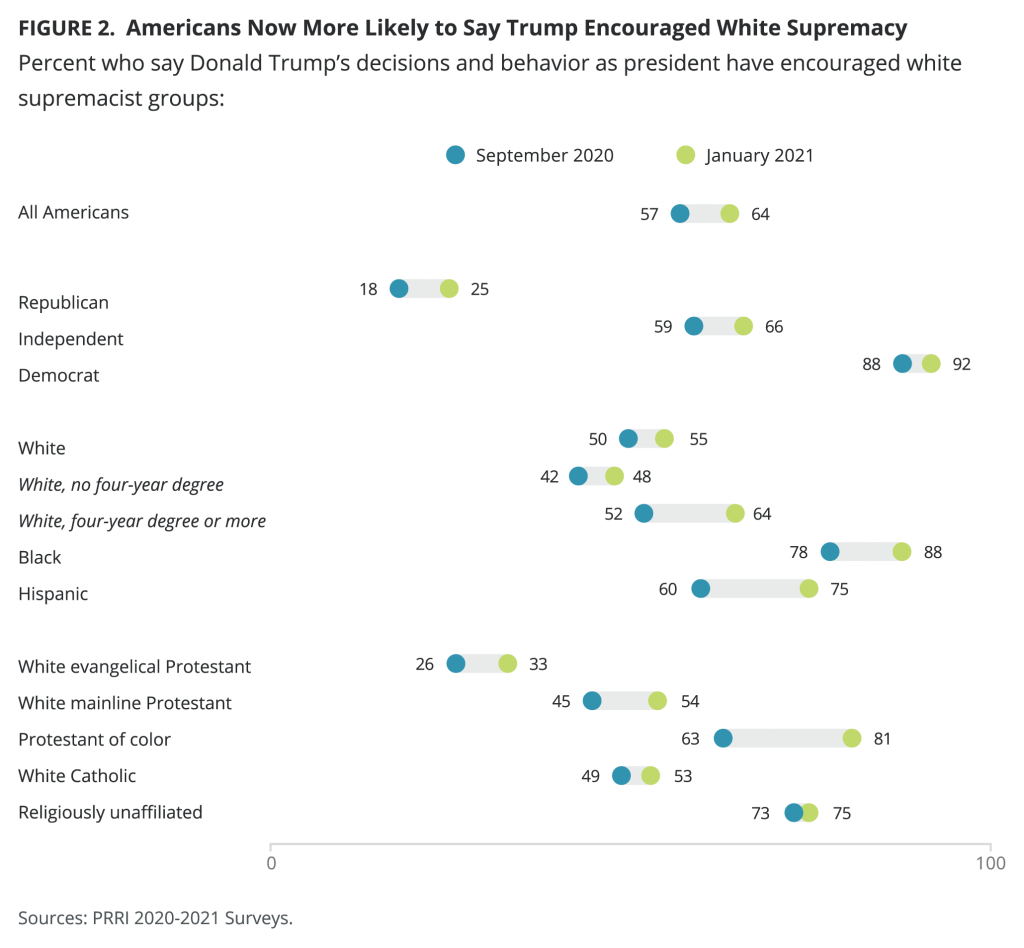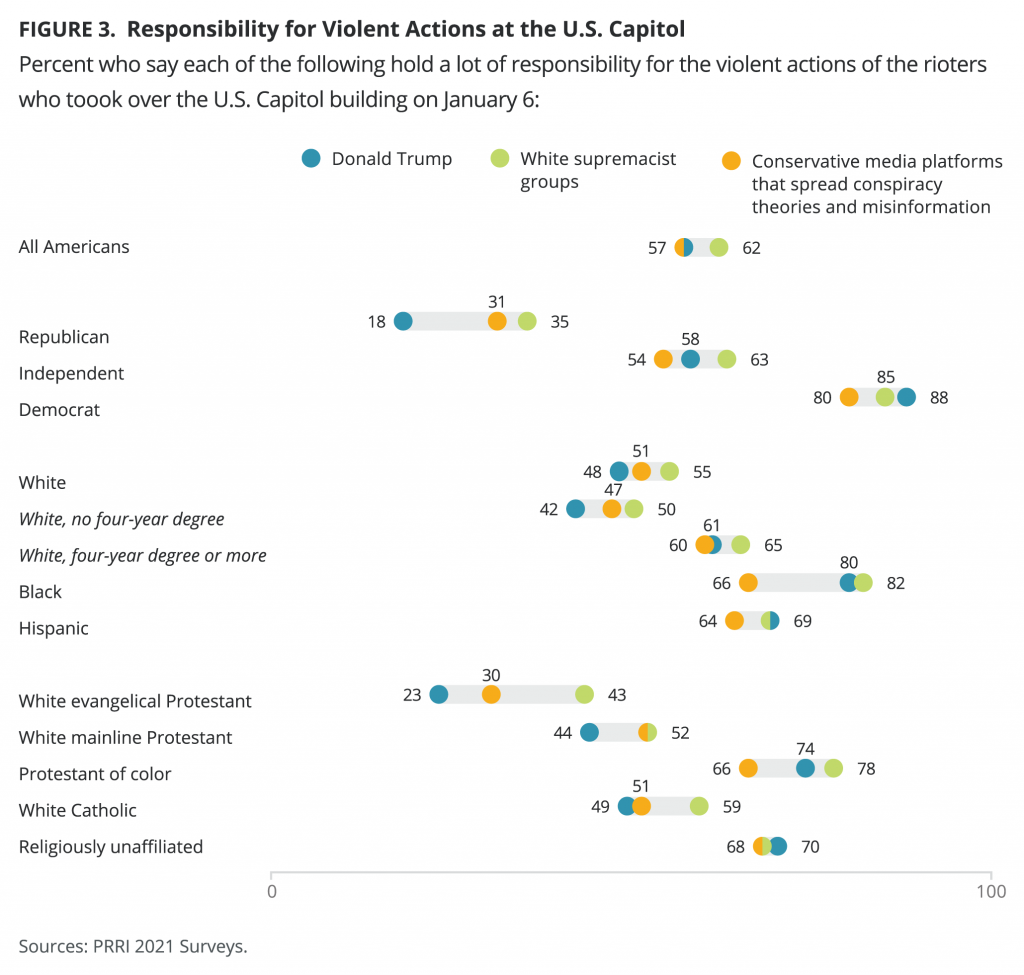Majority of Americans Blame Trump, White Supremacy for Capitol Riot
After January 6 Riot, More Americans Think Violent Language Inspires Violent Action
In the aftermath of the January 6 riot at the U.S. Capitol that was stoked by calls to fight to keep Donald Trump in office, 60% of Americans say that harsh and violent language in politics contributes “a lot” to violent actions in society. An additional 30% say it contributes a little, and only 9% say harsh and violent political language does not contribute at all to violent action.[1]This is a distinct change from September 2020, when a slim majority (51%) said harsh and violent political language contributes a lot to violent actions, 32% said it contributes a little, and 16% said there was no link. Responses to this question in 2019 were similar to those recorded in 2020.
Democrats are more likely than Republicans to say that harsh and violent language contributes a lot to violent actions (79% vs. 37%), but the increase in this viewpoint over the last few months has occurred across the political spectrum. In the fall of 2020, 72% of Democrats and 31% of Republicans said violent language contributes a lot to violent action. Independents’ responses track with those of all Americans, rising from 51% in 2020 to 61% now.
Hispanic Americans have become more likely to say that harsh and violent language contributes a lot to violent actions, increasing from 54% in 2020 to 71% now, and white Americans jumped from 46% in 2020 to a majority (55%) now. The increase among white Americans is similar regardless of education level: Those without a four-year college degree increased from 43% in 2020 to 51% now, and those with a four-year college degree or more increased from 52% in 2020 to 63% now. Black Americans have held steady, with about two-thirds saying violent language contributes a lot to violent actions both now (66%) and in 2020 (64%).

More Americans Think Trump Encouraged White Supremacist Groups
Americans have also become more likely to say that Trump’s decisions and behavior as president have encouraged white supremacist groups since the January 6 riot, which was at least partially organized and carried out by white supremacist groups. More than six in ten Americans (64%) now say that Trump has encouraged white supremacist groups, compared to 57% in September 2020. Now only 4% say Trump has discouraged white supremacist groups (compared to 7% in 2020), and 30% say his decisions and behavior have had no effect either way (compared to 35% in 2020). These numbers had been stable from 2018 through 2020.
More than nine in ten Democrats (92%) say Trump has encouraged white supremacist groups, a slight increase from 88% in September 2020. Almost two-thirds of independents (66%) agree, an increase from 59% in 2020.[2] Although only one in four Republicans (25%) say Trump has encouraged white supremacists, that is a statistically significant increase from 18% in September 2020. Still, nearly two-thirds of Republicans (66%) say Trump’s actions have not had an effect, either way, a similar share to the 70% who said the same in September 2020.
Among racial and ethnic groups, Hispanic Americans again show the largest shift. Three in four (75%) now think Trump has encouraged white supremacist groups, compared to 60% in 2020. Black Americans increased to 88%, from 78% in 2020, on this question, but due to small sample sizes the difference is not statistically significant. The smallest majority who say Trump encourages white supremacist groups continues to be among White Americans (55%), who have seen a slight increase from 50% in 2020.[3]

Who’s to Blame for the January 6 Riot?
More than six in ten Americans (62%) say white supremacist groups shoulder a lot of responsibility for the violent actions of the rioters who took over the U.S. Capitol on January 6. Another 22% assign a little blame to white supremacist groups, and only 14% say such groups are not at all responsible. Republicans are least likely to hold white supremacist groups responsible. Just over one-third of Republicans (35%) say these groups hold a lot of responsibility, compared to 63% of independents and 85% of Democrats.
A majority of Americans (57%) believe that former President Donald Trump holds a lot of responsibility for the violent actions of the mob that took over the U.S. Capitol on January 6. An additional 16% say Trump bears a little responsibility, and one in four (25%) say he is not at all responsible. Republicans are least likely to blame Trump, with only 18% saying he holds a lot of responsibility and 25% saying he bears a little responsibility for the violent actions. Independents (58%) and Democrats (88%) are much more likely to say Trump shoulders a lot of the blame.
A similar majority of Americans (57%) assign a lot of responsibility for the violent actions of January 6 to conservative media platforms that spread conspiracy theories and misinformation. Almost one in four (23%) say these platforms shoulder a little of the responsibility, and 18% do not assign any responsibility to these platforms. Only three in ten Republicans (31%) say these types of platforms hold a lot of the responsibility for the violent riot, compared to 54% of independents and 80% of Democrats.
White evangelical Protestants are the only religious group among whom a majority does not place a lot of responsibility with at least one of the three groups. More than three in four Protestants of color (78%), two-thirds of religiously unaffiliated Americans (68%), and majorities of white Catholics (59%) and white mainline Protestants (52%) say that white supremacist groups hold a lot of the responsibility for the violent actions on January 6. Only 30% of white evangelical Protestants assign a lot of responsibility to media platforms that spread conspiracy theories and misinformation, and even fewer (23%) say Trump bears a lot of responsibility. Majorities of every other group assign a lot of blame to such media platforms, and at least pluralities say Trump holds a lot of the responsibility.

Methodology and Footnotes
METHODOLOGY
The survey was designed and conducted by PRRI among a random sample of adults (age 18 and up) living in the United States and who are part of Ipsos’s Knowledge Panel. The survey included a national sample (N=1,019) representing all 50 states. Interviews were conducted online between January 15 and January 18, 2021. The margin of error for the national survey is +/- 3.2 percentage points at the 95% level of confidence, which includes the design effect.
[1]Protestants of color include Black Protestants, Hispanic Protestants, and Protestants of any other race or ethnicity. These groups are combined due to small sample sizes.
[2] Both the Democrat change, from 88% to 92%, and the independent change, from 59% to 66%, are just shy of statistical significance at the p<0.05 level.
[3] The change among white Americans from 50% to 55% is just shy of statistical significance at the p<0.05 level.




